- Joined
- Sep 24, 2024
- Messages
- 1,081
- Level up in
- 1419 posts
- Reaction score
- 6,275
- Points
- 3,577

I normally wouldn't read two similar books right after the other, but the allure of Peter Tonkin's Killer – along with an extremely positive experience I had reading Hell Hound, as described in my last post – was too much to resist, so I jumped right into it at the start of January. I really enjoyed it!
An English research group crash-lands on a small patch of ice in the remote arctic sea and, along with surviving the freezing ocean climate, must constantly evade a pack of EVIL KILLER WHALES, AGLBGLBGLBGLB (that's the sound killer whales make). It's billed as a horror novel, but it's really not "scary" in the traditional sense – it's more about the harshness of living in a cold, icy, environment, and outlines an atmosphere of being lost at the end of the world beautifully.
The plot moves insanely fast – you'll go from having a father and daughter share a tender bonding moment on one page to a (literally) visceral battle with a polar bear on the next – so it never gets boring or stale, and the book isn't long enough to get tired of any of the characters. Speaking of, I like the cast quite a bit: they're all kind of one-note and stereotypical (the absent-minded professor and his beautiful, intelligent daughter, the experienced, spiritual Inuit, the resentful, short-tempered rival), but they've got strong, tight dialogue and I wasn't annoyed by any of them. If you like the idea of braving the arctic with some smart, resourceful characters, I'd recommend it happily. GORSE'S RATING: 4 OUT OF 5 UNSTABLE ICE STRUCTURES

It's a collection of short stories presented to the reader through a series of tarot cards being played by several in-universe narrators. For example, a narrator might play The Magician (I) at the beginning of the story to identify his profession as an alchemist, then The Devil (XV) to describe how an evilton would want to apprehend his research for nefarious means, then Justice (XI) to conclude that the villain had been defeated, and so on. Both the Major and Minor Arcana are used.
It's an interesting gimmick, but I don't think it leads to particularly strong storytelling. Calvino's writing is very flowery and poetic, with constant references to things like the Greek pantheon and Shakespearean theatre, and it all comes across as kind of meaningless and random. Having just finished the book today, I couldn't tell you which of the short stories was my favourite – they all were pretty flat and uninteresting, and it just seemed like I was reading one old man's ramblings after the next until the book ended. I suppose it was competent enough, but I didn't enjoy myself at any point in the book, and I was glad when it was over. It did have some nice full-colour reproductions of the cards, though, and I really like the book's Chinese cover. GORSE'S RATING: 2 OUT OF 5 COPIES OF THE "PAGE OF COINS"




